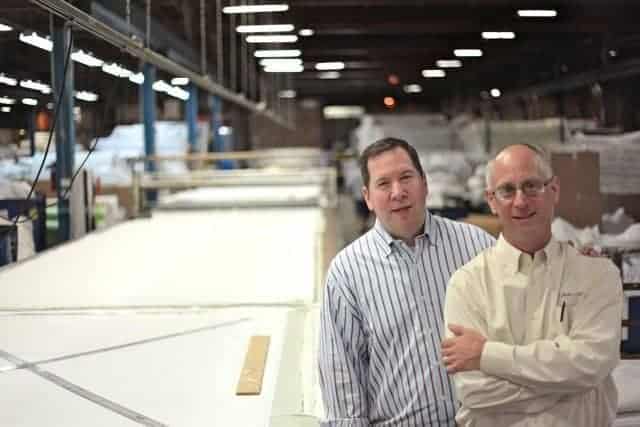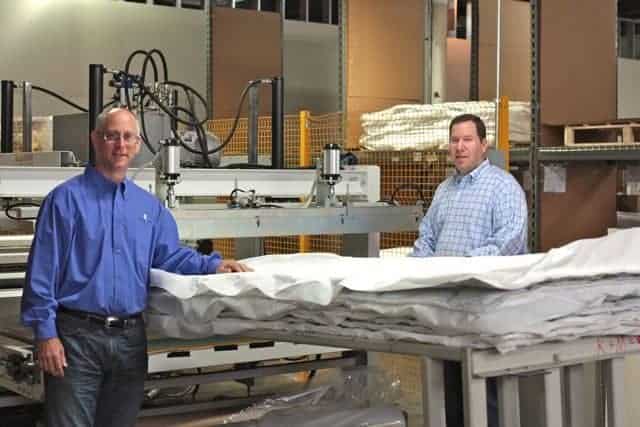Over the last three years, A. Lava & Son, a 98-year-old family-owned business with strong ties to the bedding industry, has dramatically increased its capacity, added significantly to its work force and upgraded its manufacturing technology. This robust expansion is part of the company’s strategy for increasing its importance to bedding manufacturers, while setting the stage for entry into additional markets.

Panorama of the factory floor at A. Lava & Son Co. in Chicago, a diversified supplier of sewing and textile-products.
The strategy has deep roots in a heritage of entrepreneurial stewardship that has been passed down through three generations to the company’s current owners, cousins Steven Appelbaum and Adam Lava. Appelbaum is A. Lava’s president and Lava is vice president.
Titles don’t seem to mean much to either cousin, however. What matters to them are the lessons they learned from their parents and grandparents, who, in turn, learned them from their great-grandfather, Abraham Lava, the founder of the Chicago-based company.
“It’s about family, a strong work ethic and (the understanding that), if you’re not always looking to the future, you’re going to fail,” Adam Lava explains.

Fourth generation Cousins Adam Lava, left, A. Lava & Son’s vice president, and Steven Appelbaum, right, the company’s president.
“Steve and I are not ego-driven and neither of us seeks out acclaim,” he continues. “We just need our pats on the back from each other and our families.”
Those lessons and that attitude allow the pair to work collaboratively in ways that enhance their twin goals to maintain the integrity of their company, while expanding its scope.
“Steve manages the day-to-day,” Lava says, “and I’m the future guy. You need to balance both to succeed.”
A commitment to incremental growth underpins their balanced approach to running the company.
“We’re just looking to hit singles,” Lava says. “Nine times out of ten, we’re just trying to get on base.”
A. Lava & Son, a manufacturer and distributer of bedding textile products and supplies, draws 80% of its annual sales from manufactured products and 20% from distributed supplies, including mattress ticking, thread and mattress bags. Contract quilting and cut-and-sew operations are significant parts of A. Lava’s manufacturing efforts. The company also offers quilt kits and wooden bed frames and foundations.
Appelbaum explains: “Bedding companies come to us for contract quilting because of limitations on their own capacity, and some also ask for help with sewing to ease their production (load). The largest part of our manufacturing, however, is (dedicated to) producing covers for specialty bedding manufacturers.”
Seventy-five percent of A. Lava’s annual sales come from products sold to the bedding industry. The balance comes from cut-and-sew contracts across several industries.
“Basically, we’re a factory that can make any kind of cut-and-sew product,” Appelbaum says.
The company’s Chicago factory, along with warehouse space, covers 233,000 square feet and employs more than 400 people. A. Lava utilizes another 50,000-square-foot warehouse and distribution center in Riverdale, California.

Growing a business Lava and Appelbaum have dramatically increased the company’s capacity, added to its work force and upgraded its manufacturing technology.
It accessed another 65,000 square feet of manufacturing and warehouse space in Stokesdale, North Carolina, when it entered into a joint venture with Culp Inc. almost two years ago. Culp Inc., which is based in High Point, North Carolina, is a publicly traded mattress and upholstery fabric manufacturer and distributor.
The new venture, Culp-Lava Applied Sewn Solutions (CLASS) “was created to mirror our production capabilities for specialty bedding,” Appelbaum explains.
“We wanted to align ourselves with another great company (so that we could) expand our capacity (with) another factory and serve a larger geographic area. Culp Inc. is a leader on the ticking side and excels in ticking design. We have expertise in designing covers. Together we can create beautifully designed covers at greater speed to market than anyone else.”
A commitment to consistently “hitting singles” can add up to some pretty big scores. The company’s recent growth, Appelbaum says, “is really coming out of that factory.”
And the growth has been significant.
“From a production standpoint, CLASS has gone from a skeleton crew to 150 people, producing thousands of products a week,” says Appelbaum. “Overall we’re where we thought we’d be in year five.”
And there’s room for further growth.
“If we operate two shifts 24/7, we could double or triple our production,” he says.
Adam Lava sees the CLASS joint venture as a game changer.
“Instead of creating covers in a vacuum, we’re able to access Culp’s worldwide reach of textiles, and create covers with specific customers in mind,” he explains. “Their reach into all home textiles gives us the opportunity to make pillows, pet products, outdoor cushions, government contract work, almost any type of cut-and-sew product.”
A. Lava covered yet more bases when it acquired the assets of VyMaC Corp., a mattress component supplier and sewing contractor, in March of this year. The purchase included “everything but the buildings,” Adam Lava says, and opened up yet more possibilities for the company.
“It enabled us to expand capacity, improve some (machinery) systems and enter into areas of business that we hadn’t been in before,” he adds. “It also gives us the opportunity to develop relationships with more people and show them what we can do.”
The company currently sells in all 50 states, Canada and the Caribbean. In addition, it makes Euro-sized covers for mattress manufacturers who sell in Europe. It also fields a team of five sales representatives, three of whom work full time for the company.
A. Lava’s customer base covers the entire spectrum of the mattress industry.
“We sell to most of the major players along with medium-sized companies and factory directs,” Appelbaum says.
The partners say that their expanded infrastructure and growth spurt have highlighted the need to increase the company’s staff of professional employees.
“We’ve come to realize that we need to hire talented people to help us achieve our goals in these new ventures, but we’re picky in the people we hire,” Lava explains. “We want them to fit into our family business environment.
“We’re not big on micro-managing,” he continues. “We want people who are self-motivated and independent. We have very little turnover, because people are comfortable working here. We’re a nurturing environment, not a punishing one.”
Appelbaum adds: “We don’t want layers of bureaucracy or to spend our days in meetings. We’re very hands-on, and the big challenge is to remain that way. Everyone sees how hard Adam and I work, and that we’re not afraid to get our hands dirty. Sometimes I forget that I’m not just a guy working for my dad.”
The cousins work hard because they take everything about A. Lava & Son personally.
“Steve and I work longer hours than our wives would like, and than our competitors do, because we don’t want to let people down,” Lava says. “I don’t want to let customers fail just because I want to go home and watch the game. We need to try to continue to build so that we can support the 400-plus families that work for us and our own families.”
Appelbaum and Lava know, however, that managing growth is one of the biggest challenges that they face.
“The bigger you get, the more you have to lose,” explains Lava. “Relationships can come to be based more on a spreadsheet than a handshake.”
Nimbleness and flexibility rank high on the list of advantages that neither wants to lose through growth.
“When we do see an opportunity, Adam and I can make the decision quickly, make plans and then implement them swiftly,” Appelbaum says. “We talk about what the future holds everyday; it’s our driving question.”
Lava sees a variety of potential paths.
“We’ll continue with our core mattress business, but add on consumer products that are unrelated to the core business,” he says. “We want to build the brand on the home furnishings, apparel or case goods sides. We have a factory that can make a myriad of products. We just need to pick a path that we’re passionate about and follow it. And just keep hitting singles.”




